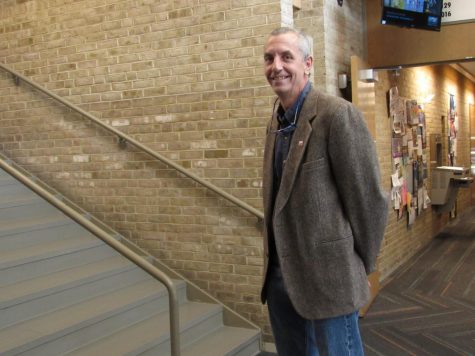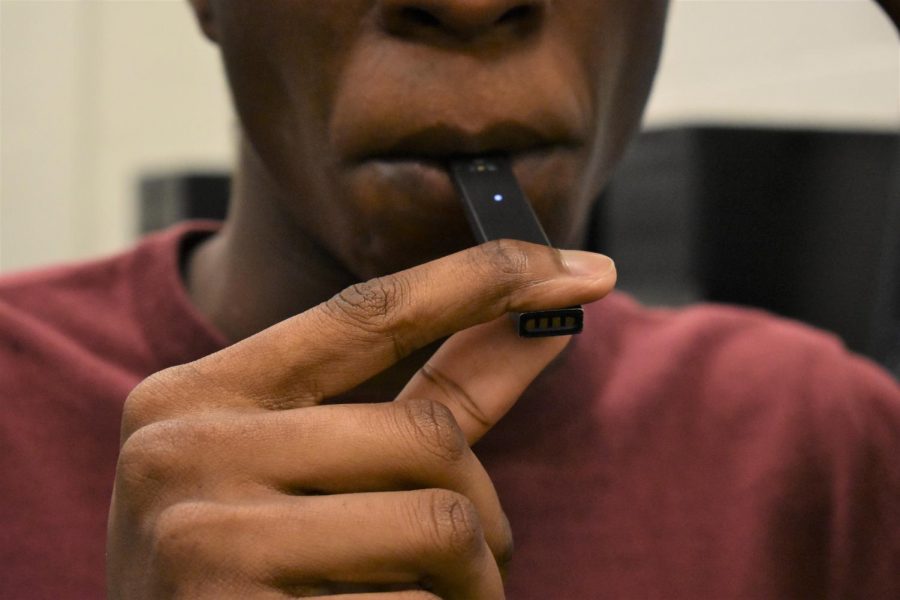MD legislature votes to increase legal age of purchasing tobacco products
Maryland raises the legal tobacco purchase age to 21.
April 8, 2019
Maryland legislature voted to increase the legal age to purchase tobacco from 18 to 21 on April 3.
Legislature voted in favor of the bill that if passed would increase the legal age to purchase such products like Juul, Suorin, and other e-cigarette products. However, 18-21-year-olds with a military ID are exempt from the ban.
The bill was brought to attention from an increase in underage teens becoming addicted to Juuling.
An informal poll of twenty students and three faculty members around campus found they agreed with the health goals of the ban but disagreed with its effectiveness and the military exemption.
Most said all 18-21-year-olds should be treated as adults equally.
Second-year transfer studies student Joey Niles said he would be okay with the age legal age increasing.
“I don’t know if I would quit but I probably would wait until I turn 21 to purchase those products again,” Niles said.
Niles who is currently 20, uses a Suorin Air, one of the many options tobacco users have to select from.
A study from the National Youth Tobacco Survey has shown that the e-cigarette use has made a 10.2 percent increase in both middle and high school from 2011 to 2017.
Another study in Tobacco Control, has shown that of the Juul users ages 15 to 24 years old, 63 percent of them did not know that nicotine was in the product they were using, and 15 to 17 year old’s are 16 times more likely to use the product than that of people aged 25 to 34.
According to Brooke Raino, a registered nurse in the Health Center described a Juul as a small, USB-shaped device that contains liquid nicotine.
“There are different concentrations of nicotine,” she said. “It’s not FDA regulated, so nobody really knows [what’s in it]. But kids as young as middle school students are doing it.”
Raino said since the product has become so popular, students have come into the Health Center seeking help.
“If they come in for JUULing concerns, it is for the smoking cessation program,” she said. “I probably see weekly someone who come in and wants to try to quit JUULing or vaping … We have students coming in and we test carbon monoxide levels for it. I can say that the carbon monoxide level is much higher in people who JUUL and use e-cigarettes than people who smoke [combustable] cigarettes.”
Raino states increased levels of carbon monoxide is a problem because “carbon monoxide is a foreign substance that should not be in your blood. It can lead to health problems, respiratory problems, and emphysema.”
Shad Ewart, a business management professor, said another health problem is nicotine is how addicting it can be.
“I quit [smoking] seven times,” he said. “Six times I was unsuccessful at quitting … Of course, it’s highly addictive, far more addictive than cannabis. A lot of my students use [nicotine] products.”

“Kids are going to find a way to do whatever they want to do,” said Robert Moore, a first-year transfer studies student, “Just like with alcohol, kids under the age [limit] drink all the time. They can find a way to get what they want to get.”
Moore stated he occasionally uses nicotine products but if the law went into effect, he would stop.
Brandon Belcher, a first-year physical therapy student, also is a nicotine user who agrees with the bill.
“You can find other ways to get [the products],” he said. “But this will make it harder on you. It will give you more time to focus on other things besides JUUL.”
However, others were less optimistic.
Nathan Frost, a second-year transfer studies student, had heard about the bill but didn’t think it would deter young people from using nicotine products.
“I don’t think it will have an effect,” he said. “People are still going to find a way to get their product, to get their fix, no matter what age.”
Ezra Harper, a first-year biology student, pointed out the bill could increase its effectiveness by adding a rehab component to reduce nicotine dependency.
Harper suggested for Maryland politicians to consider including in the bill an “awareness of programs for those who may suffer from withdrawal.”
Ethan Cronin, a first-year computer science student, pointed out an unintended consequence of the measure.
“I have a friend who works at a Vape shop and she is 18,” he said. “So, if this gets passed, then she can‘t work there anymore until she is 21. There’s a lot of young people who are into it and are in that age range who probably also work in the industry.”
Legislators did take into consideration young people who work for the military, but students and faculty who were polled felt this was unfair.
“I am very appreciative of the effort of anyone that is willing to join the military,” Ewart said.
“I appreciate what they [Maryland legislators] are trying to do here, but I believe in choice. I believe people should be given the information, understand what the consequences are of smoking cigarettes. And I think at 18 they can make that decision for themselves.”
“So, the fact that they let people who are in the military make that decision for themselves [it then] seems a little odd that they wouldn’t let other people who are not in the military make that decision,” he said.
Michael Dudtzman, a second-year computer science student, pointed out, “I do see the hypocrisy there. It should be legal for all adults, not just the ones in the military.”
However, some felt there should be an exemption for 18-21-year-olds serving in the military due to the nature of their job.
“I believe they should have the right to because they are doing a service for our country,” said Thomas Hall, a second-year physical education major. “And I believe the same thing for the drinking age. I think they [youth in the military] might have better judgment.”
“I would be actually against it,” Ewart stated after considering the exemption. “I believe that at 18 you can vote, you should be able to make that decision [regarding nicotine use] for yourself. I believe in choice. I believe at 18 you should be able to make that choice be it about cannabis, alcohol, or tobacco.”
Jump Start student Andrew Trott has been using the Juul product for one year.
“My brother introduced me to the Juul my junior year of high school and I’ve used it ever since,” Trott said.
Trott also said that if the bill is passed, he will get his older sister who is over 21 to buy the Juul pods for him.
“The bill really won’t stop anything,” Trott said. “Everyone I know who juuls either has a fake license or knows someone who is over 21.” Still, if Governor Larry Hogan (R) signs the bill into law, Raino said it’s an opportunity for current nicotine users to quit.
“We offer, free of charge, not just for students but for their family, partners, and other community members, nicotine patches, gum, and lozenges,” she said. “We can do a reduce-to-quit program, we can do combo therapy where you can use a patch and a lozenge, and we can ask you to come in on a weekly basis.”
“We give you enough supplies to last the week and then we just want you to follow up with us so we can see what’s working or what’s not working,” Raino added. “And research shows that a little one-on-one helps yield better results for quitting in the end.”
Additionally, for 18-21-year-olds in the military, the Department of Defense published a study in 2016 detailing the problem of rising nicotine use by service members and advocates for its own smoking cessation programs.
“So don’t start,” Raino said. “But if you do start and you want to quit, health and wellness services can help.”












